T H E D I S T A N C E S and / or C I T I E S (10)
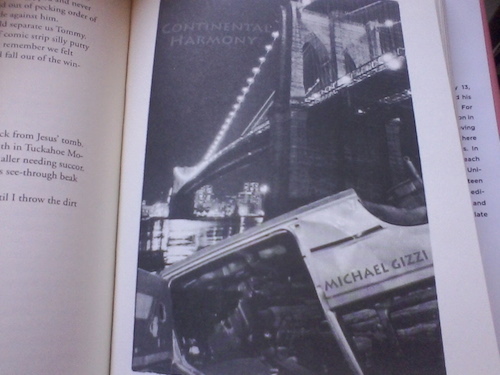
Last Friday afternoon in San Francisco I left our place on Ellis walking north up Larkin and took a right on Broadway east through the tunnel to City Lights Books on Columbus in North Beach. I quickly browsed the poetry collection, then popped next door to Vesuvio's bar. Sitting in the upstairs, looking out the window at traffic on Columbus and City Lights across the alleyway, I sipped my beer as I read through the latest issue of the free Anarchist newspaper Slingshot (delighted to locate a quote to lift out and pop into my upcoming review of Filip Marinovich's Wolfman Librarian ). Soon I saw poet Jackson Meazle in the alley on a smoke break from work at City Lights. I couldn't get his attention.
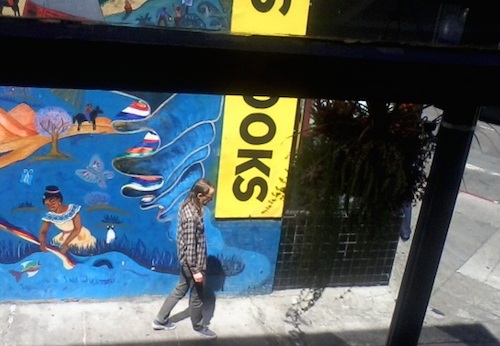
Derek Fenner of Bootstrap showed up right as I started to call Jackson's phone. Jackson didn't pick up. I left a message discussing smoking, spitting, Vans shoes, and other matters. I then sent him the above pic (he texted back: "Come over creep!") Happily however Derek wasted no time in bringing out the copy of Michael Gizzi's Collected Poems edited by Clark Coolidge and Craig Watson which he had promised to bring over for me. The publisher, Geoffrey Young, of The Figures Press had sent a few copies Derek's way to get it "out there." It's a terrific looking book.
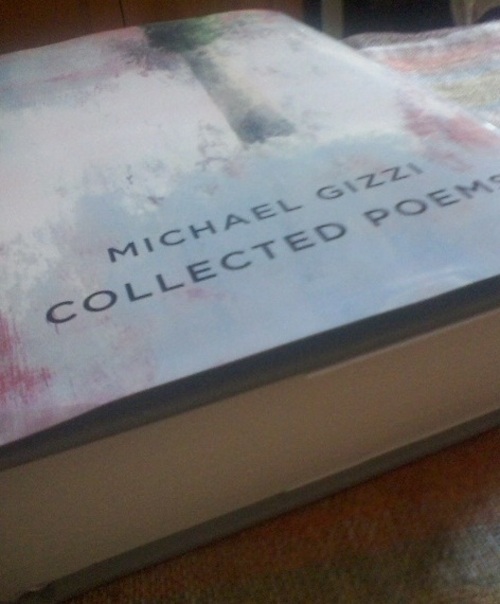
This is the first opportunity I've had to really look into Gizzi's work as a whole. A few years ago I reviewed his collection New Depths of Deadpan. I was stoked to find that what I said of the poems in that collection, "these poems scamp across the page in lively play of language and imagination achieving that rare comfortably of hitting stride in new spaces," feels just as true of all of Gizzi's poems.
Some examples.
I just had to put mom
who insists on being known
as a pre-code cartoon to bed
it's fine for you people to worship
from every hedge and hello funny papers
I'm being haunted by a crooner
like any disease it's a goldmine
say, where your ears would be
if you could see them in your mouth
("No Time to be a Muskelunge" form McKenna's Antenna)
This head is no palace it's the Motel Abuse
Its guests are not welcome but disembodied
seep their message through the rocks
in my ear. The joke is they're dissatisfied
and refuse to pay for the room. How
can I evict them they don't know
their voices are the wards of my state
("Ode of it All" from Continental Harmony)
As poet William Corbett describes it in his Introduction to the Collected, Gizzi writes poems "with urgency, humor, and mocking wit" and while the early work does show "formal decisions he held to---an almost complete refusal of punctuation, a liking for declarative lines----[...] the poems are built in a deliberate way, brick by brick." Corbett also notes "The poet Ed Barrett described him as a 'ruined angel,' which sounds right." Derek had heard that the recent reading celebrating this new collection held at the Poetry Project was of heavy heart, everybody there missing Gizzi dearly. It sounds as if a San Francisco reading is in the works. I'm looking forward to hearing the poems read aloud in celebration of such terrific work.
Now I enter the sea perpetual semblance of a quiet man smoking his fingers in an English pavilion. A dead guide we can chat with. The air of my heart arranges a race knives. Truth may never enter the mind of what originally thought it. after Jean Fremon
(from NO BOTH)
That magic moment in Sanskrit
when the lights come up that extend back
every bit as far as that clobber kid stuff
("Bwana Filtration System" from Too Much Johnson)
a man is
who he haunts
("Vita Ova" from My Terza Rima)
an uninspired note this
here between selves both
this sound
that singing hears
(from Species of Intoxication "Extracts from the Leaves of Doctor Ordinaire [...] who sold his recipe for absinthe to Henri Louis Pernod")
Some 14 or so of the 19 titles gathered together here were slim stapled affairs of publication. The poems are arranged in chronological order presented as originally published, including the cover images for every collection. Gizzi's published works range from 1973 on up to In This Skin written to Pen Creeley and self-published in an edition of 8 copies, two months before his passing away in 2010.
Perhaps we live and know
Deep down that we are immortal
And that sooner or later others
Also immortal will forget us
("In This Skin" from In This Skin)
This last all too brief collection is then followed by a surprisingly eclectic amount of "Uncollected Poems" and an even more surprising number of "Last Poems" not included in In This Skin.
I neither believe nor disbelieve in anything
("The Voyage" dated 9/26/10 from "Last Poems," Gizzi passed away in October of that year.)
Gizzi's Collected is a clear labor of loving friendship and admiration. I know it's destined to receive the sort of abusive attention that's attended other essential poet's collections I've pored through over the years. My bookshelves and kitchen table are not too safe for books. Creeley's Collected Poems 1945-1975 has not only been taped back together it's even been burned! Whereas coffee and wine drippings abound on the back cover of James Schuyler's Collected.
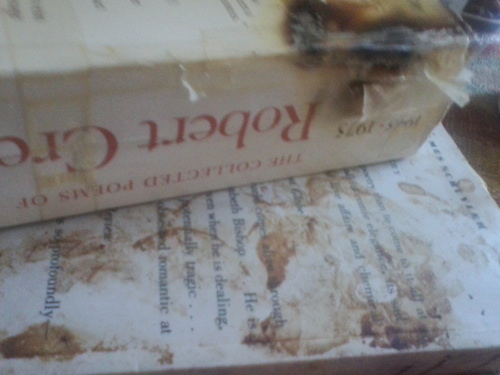
Over the weekend I already started jotting down some new poems (for the first time in a few weeks) as I pored through Gizzi's Collected. He just gets the synapses firing.
Derek also, to my surprise, brought out from his bag the very first two copies of the latest Bootstrap title, fresh from a Fed Ex envelope from the printers, Tongo Eisen-Martin's someone's dead already. Derek's mentioned Tongo here and there, I think. They work together in the East Bay teaching disadvantaged youth, but he never had said much about this book. Suddenly here it is! perfectly sized for the pocket, too.
Tongo showed up shortly after Derek showed me the book and Derek handed both copies over to him. Like any of us with their first published full length collection, Tongo is one stoked poet.
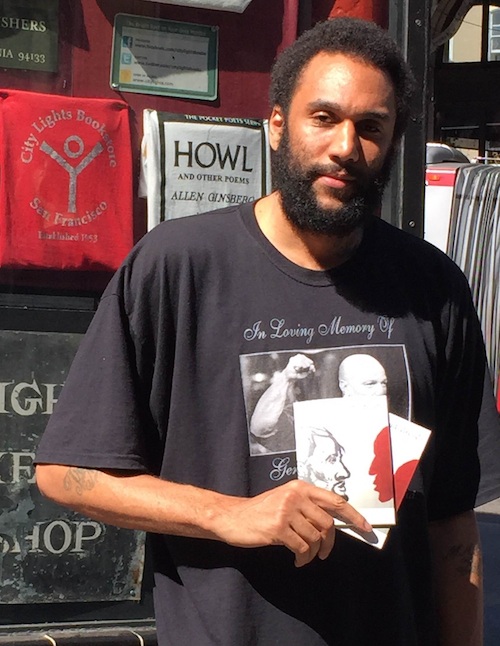
Tongo and Derek pointed out to me the poem Tongo had recited to one of their students (it was this recitation which alerted Derek to the fact that Tongo was not only a poet but a damn talented one at that) and I've been marveling over this one line of his ever since: "There’s a cow’s mouth on the flag" I mean: what the fuck. That's nothing but sheer brilliance.
On top of that, though Tongo's recognized as a spoken-word poet in the lineage of Nuyorican Poets Cafe where he's performed, his poems are as alive on the page, moving around, comfortably exploring the space. Unlike many other poets who just hug the left margin, resulting in a narrow column of lines running down the page, there's nothing stagnant with Tongo's arrangement of his lines. They move all over the page in skilled precision. No slop. He said he just listened to the conversation of the voices he was hearing from the poems as he wrote them. I immediately recalled Faulkner's line "I listen to the voices" which has always spoken to me. It's the real deal when the work isn't work to get out onto the page but rather just flows: alive as anything.
This is the sort of poetry that gets me excited. I love to see hints of poets stepping outside the expected boundaries poetry world, even if unintentionally, often imposes. Let's not classify, let's just read and write. Read everything and write anything.
For years I've played around in my head the idea of poet Ted Berrigan longtime recognized as an outsider to most scholarly approaches to poetry was a close-as-ever reader of John Berryman highly recognized on the inside track academically. I recently wrote a review of FSG's new Selected Berryman edited by Daniel Swift, alongside Philip Coleman’s John Berryman’s Public Vision: Relocating the Scene of Disorder wherein I briefly explore this connection. I write in part:
...it’s not at all difficult to imagine Berrigan taking interest in the highly staunched challenging eclecticism found in just about any of the 8-line sections of Berryman’s Homage to Mistress Bradstreet:
19
So squeezed, wince you I scream? I love you & hate
off with you. Ages! Useless. Below my waits
he has me in Hell’s vise.
Stalling. He let go. Come back: brace
me somewhere. No. No. Yes! everything down
hardens I press with horrible joy down
my back cracks like a wrist
shame I am voiding oh behind it is too lateBerrigan’s increasingly acknowledged breakout masterpiece The Sonnets (1964) may in many ways be seen as his successful attempt at, among other things, outdoing Berryman at own his game by taking the poem to the street. The shuffling of “found” lines (those borrowed, stolen, or otherwise “lifted” from unnamed source material) and the high number of disparate references jumbled akimbo and scattered across the fourteen line (or often enough a few more) boxes of text found upon each page share much in common with Berryman’s work. Besides the sonnet after all was a form to which Berryman demonstrated he was more than a bit partial, despite its bad name among American Modernist poets such as William Carlos Williams. As Swift acknowledges:
“Williams instructed his generation:
‘don’t write sonnets. The line is dead, unsuited to the language. Everything that can ever be said from now until doomsday in the sonnet form has been better said in twelfth-century Italian.’
Berryman’ s whole career might be understood as a rebuke to this.”
Swift describes how Berryman’s earliest published works are sonnets and discusses how his mid-career poetic development hinges to some degree on a book of love sonnets written over the course of an extramarital affair in the fifties but not published until a decade later entitled Berryman’s Sonnets. The form of The Dream Songs may also be read as an ongoing extended-sonnet sequence. Swift also makes mention of comments by Adrienne Rich tying together Berryman and singer-songwriter Bob Dylan as displaying masterful understanding of the improvisatory nature of the American language, commenting how Dylan and Berryman “both created by theft, by allusion and borrowing.” The same description might easily fit Berrigan too, who directly offers “a rebuke” to Williams of his own in his sonnet “XV” referencing the same Williams quote, even if tongue-in-cheek:
and the sonnet is not dead.
takes the eye away from the gray words,
Diary. The black heart beside the fifteen pieces
Monroe died, so I went to a matinee B-movie
washed by Joe’s throbbing hands. “Today
What is in it is sixteen ripped pictures
does not point to William Carlos Williams.Berrigan, much like Berryman, came early on to remaking the sonnet according to his own technique, often returning to the form on repeated occasion.
Who knows if I'm on to anything here, but I dig the idea. Poets should exploit every possible angle towards the further development of our ideas about poetry.
I raise a glass to that. & I raise a glass to Tongo and to Derek, it's awesome to have Tongo's book out there.
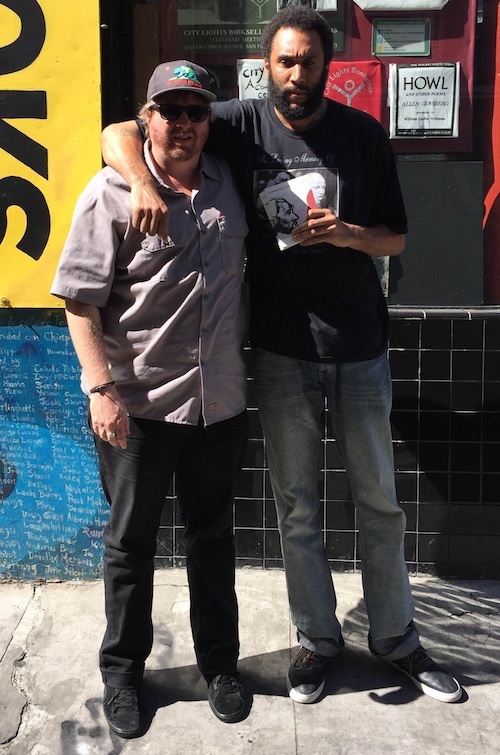
And I raise a glass to Harriett, thanks for hosting all this poetry world jazz. I've had fun. This is from downtown Chicago last fall after a friend's wedding, gazing out at the elevated tracks from up in a theatre district hotel room in "The Loop."

I hope everybody gets the opportunity soon to go stare at some water. I hope you live near some.

There's some bad shit going down in the world today. Who knows, maybe looking at the water's nothing, maybe not; as with Reznikoff's "ceaseless weaving of the uneven water" it might just become something.
Patrick James Dunagan was raised a skateboarder in Southern California and became interested in poetry...
Read Full Biography

